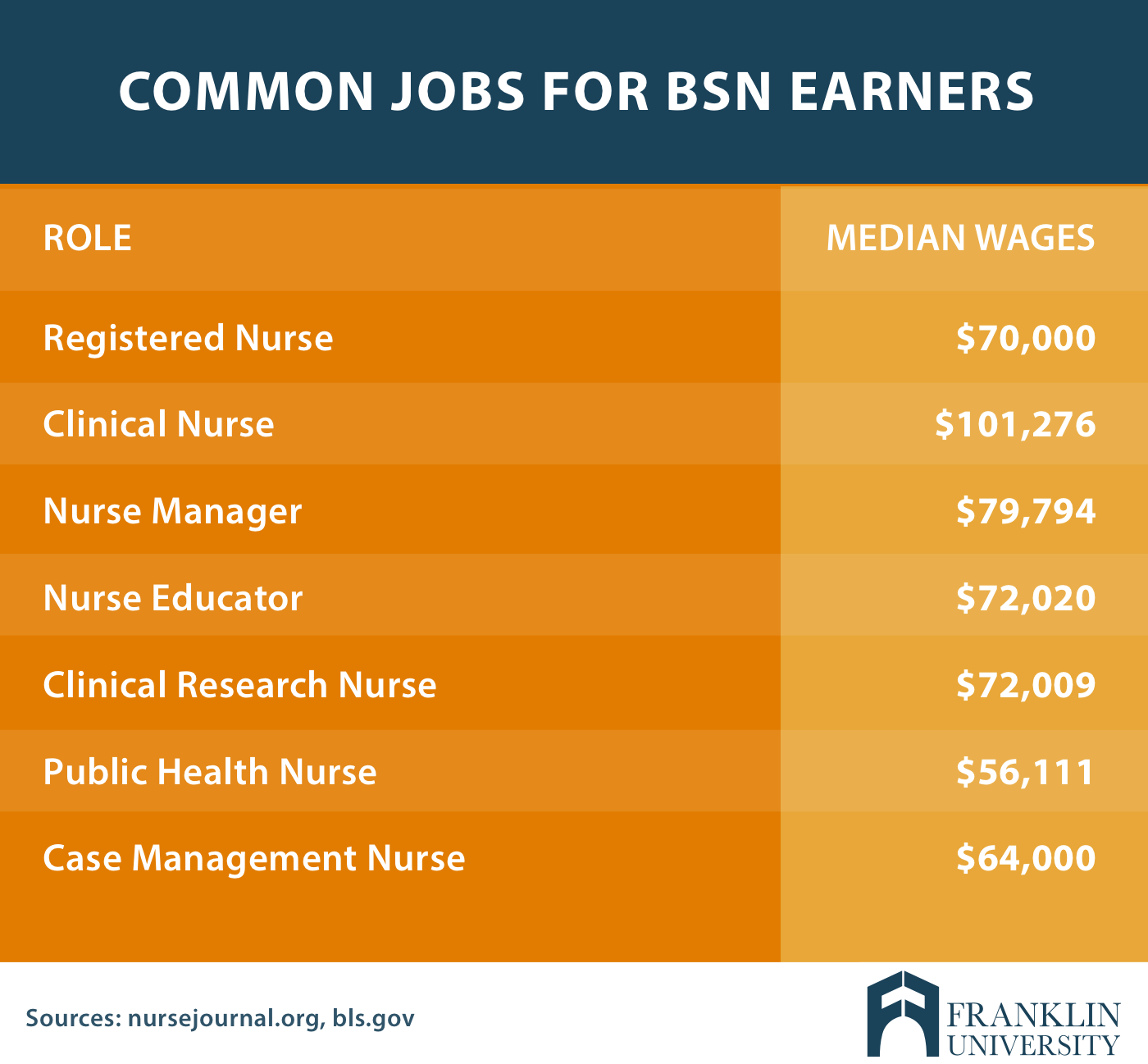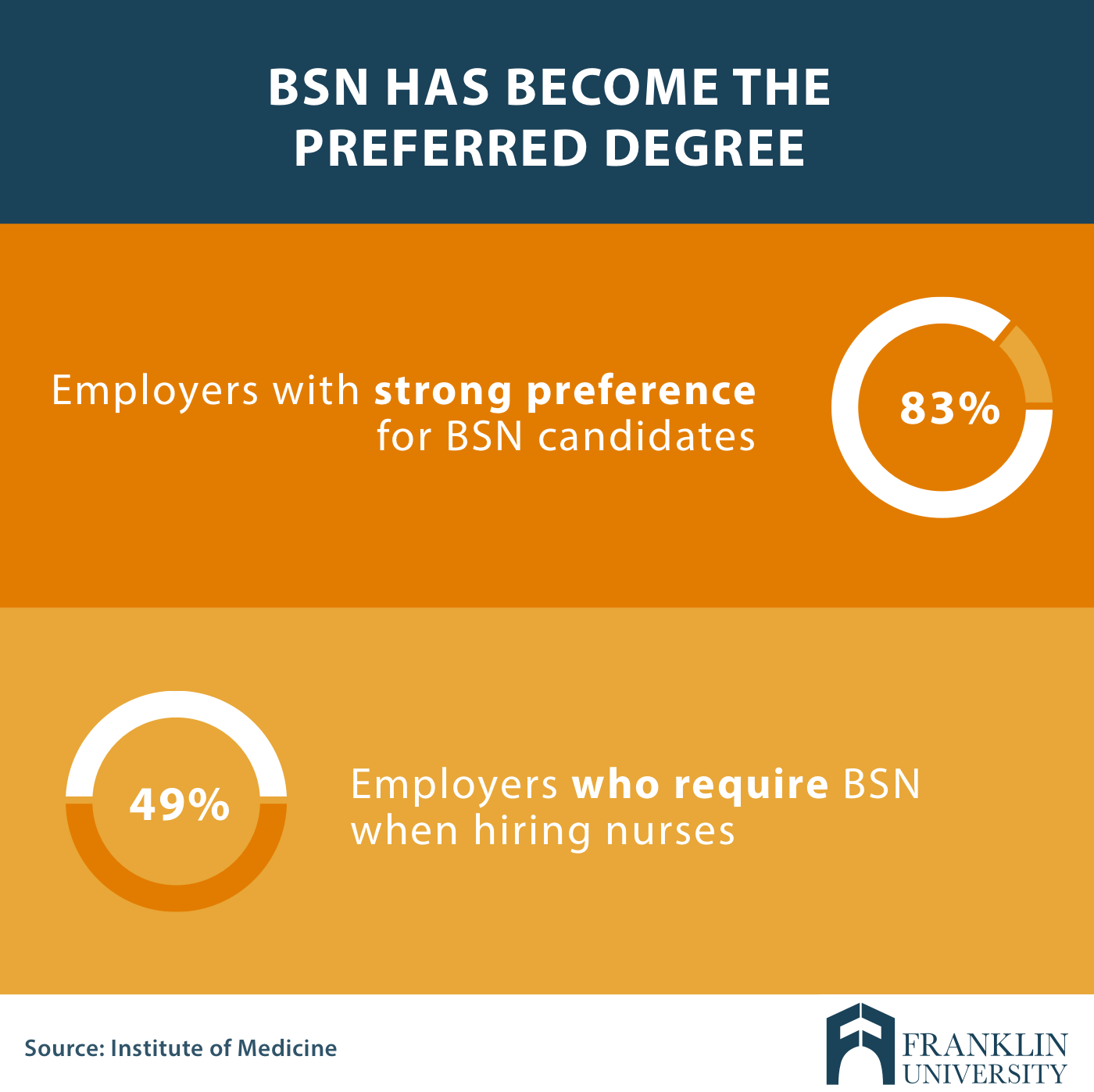Request Information
We're Sorry
There was an unexpected error with the form (your web browser was unable to retrieve some required data from our servers). This kind of error may occur if you have temporarily lost your internet connection. If you're able to verify that your internet connection is stable and the error persists, the Franklin University Help Desk is available to assist you at helpdesk@franklin.edu, 614.947.6682 (local), or 1.866.435.7006 (toll free).
Just a moment while we process your submission.

The Big Differences Between RN and BSN
The big news in nursing involves a major shift in higher education standards, requiring more nurses to hold a 4-year bachelor of science in nursing (BSN). The new requirements stem from research by the Institute of Medicine (IOM) that showed significantly improved patient outcomes when there was an increase in BSNs.
BSN, ADN, RN: The Difference in The Letters
Of course, all nurses are rigorously trained to provide patient care. To understand the different levels of training, we can take a closer look at the letters that come after a nurse’s name. BSN means bachelor of science in nursing, ADN means associate degree in nursing, and RN means registered nurse.
- BSN is a diploma from a 4-year program: A person with a BSN has graduated from a four-year nursing program at a college, university, or nursing school.
- ADN is a diploma from a 2-year program: A person with an ADN has graduated from a two-year nursing school.
- RN is a certification: A person with the RN designation has passed a national licensing exam—after graduating from a nursing program with a BSN or an ADN. The licensing exam is called NCLEX (National Council Licensure Examination), and it’s a nationwide test required to license nurses.
When it comes to paying for school, grants are among your best options. But do you know how to find them? Remove the guesswork by downloading this free guide
RN vs BSN: 5 Key Differences
So, if you’re an RN with a two-year ADN, are there reasons to go back to school and earn your four-year BSN degree? Well, that depends on you and your goals. But thousands of students and nurses are getting their BSN—and many of them are doing it in direct response to the IOM recommendation for 80% of nurses to be BSN-prepared by 2020. If the IOM says that more BSNs are better for patient health, then nurses everywhere are going to respond. Here are 5 reasons why you might want to respond to the call for a BSN degree'
1. You want to teach. With a BSN, you might use your degree to branch out into patient education. Perhaps you’d like to work in public health or as a nurse educator. The BSN gives you that career flexibility. If you want to teach in a university setting, you’ll first need to attain your BSN and then a master's degree to earn the minimum requirements.

2. You want to climb the ladder within your setting. As compared with ADN graduates, BSN degree holders are seen as better prepared for nursing supervisor and management roles within their jobs. “The coursework for a BSN has more theoretical work, critical thinking, professionalism in content, and a foundation of leadership,” according to Franklin University’s Program Chair for Nursing, Dr. Gail Baumlein, PhD, MSN, RN, CNE, ANEF. “When filling an open position for nursing management, a hiring manager looks for a BSN. Between two candidates, if all other elements are equal, the position will go to the person with the BSN.”
3. You want to earn more money. According to nursejournal.org, a nurse holding a BSN will generally earn around $3,000 to $8,000 a year more than a nurse with an ADN. When entering the field, both ADN and BSN-educated RNs start off at about the same level, earning a median salary just shy of $60,000. But within a few years, a gap begins to open. With 1 to 4 years of experience, RNs with an ADN have a median salary of $61,360. By comparison, BSNs with same level of experience earn a median salary of $69,697
4. You want to set yourself apart from other applicants. For many people, getting a BSN starts with getting an ADN. Remember that a two-year ADN provides a faster path to employment. After two years, you can earn your associate degree and take the NCLEX nurse licensing test.[JK5] So, as compared to a student who’s seeking his or her BSN, you’ll be out earning experience and a salary two years earlier. With this jump-start, you can also save some money to fund your return to school when you’re ready to earn your BSN.
Research with patients and patient outcomes has shown that nurses with a BSN have better patient outcomes on average. So, in a competitive healthcare market that must maximize patient outcomes, BSN has become the preferred degree for most hiring efforts. Based on completed responses from 586 schools of nursing, most employers expressed a “strong preference” for candidates with a BSN.

5. You want to provide optimal patient care. The biggest reason to earn an BSN is that it gives you a foundation to be the best possible nurse. After years of research by the American Association of Colleges of Nursing, the results show that having a BSN degree actually leads to improved patient outcomes, including better rates for mortality and failure-to-rescue. Also, research shows that nurses who have a BSN are more proficient in making diagnoses and evaluating the results of interventions.
From a Degree and into Practicing: The NCLEX Exam
In order to become a practicing nurse, you have to sit for the NCLEX exam. The National Council Licensure Examination (NCLEX-RN exam) is a standardized exam, taken by people who want to earn the designation of RN, Registered Nurse. The test will determine whether a candidate is prepared for entry-level nursing practice. Before taking the test, a person must do several things:
- Successfully complete an accredited nursing degree (BSN, ADN, or nursing diploma)
- Apply for a nursing license from your state board of nursing, which will determine if you’re eligible to take the NCLEX exam
- Register to take the exam (LINK: https://www.ncsbn.org/nclex-application-and-registration.htm )
Don’t assume that being a straight-A student in nursing school will mean you pass the NCLEX. You should do some online research about studying; you’ll find many videos and websites dedicated to the topic.
Can Current Nurses Earn a BSN?
With the IOM standards for healthcare providers to increase their percentage of BSN-trained nurses to be 80%, employers are changing their hiring standards:
- Hiring more BSN-prepared nurses
- Telling current nurse employees who are not BSN-prepared that they must return to school and get their BSN
- Hiring fewer (or no) nurses with an associate degree
That last point creates a challenge. If hiring practices eliminate all associate nurses, we won’t have enough nurses to meet the overall demand for the care they provide. That’s why one important goal is academic progression. Healthcare systems may be offering tuition reimbursement in order to help their ADN nurses earn their BSN. So far, such efforts have not enabled the industry to achieve the 80% BSN goal set in 2010. However, major strides continue toward increasing the number of nurses graduating with a BSN degree.
Over 600 schools offer an RN-to-BSN program, with most accredited by CCNE (Commission on Collegiate Nursing Education). Many of them also offer an online option. For your top school choices, you should try to discover what makes the program unique. “For Franklin University, the unique elements would be our 6-week courses and the fact that our admission criteria do not include a GPA requirement,” according to Baumlein. “Our program also can be completed in a year if a nurse wants to do it that quickly, or they can take up to 6 years.”
Students can also take advantage of transfer agreements with community colleges to fast-track their BSN at Franklin. With these RN-BSN pathway agreements, nursing students complete their ADN at their community college while also taking courses that are required for their BSN at Franklin.
After earning their ADN and attaining their RN license, students can take just six more courses at Franklin to complete their BSN. With 6-week course scheduling available, the BSN degree can be completed in as few as 6 months.
Going Even Further
Once you do earn your BSN, you may find that it has one additional benefit. It can be a stepping stone toward a graduate degree and the role of nurse practitioner (NP). To become a nurse practitioner, there are three requirements:
- Have experience as a practicing nurse
- Have your BSN
- Earn your MSN in the nursing specialty (family practice, oncology)
- Be an RN, licensed in your state
The Bureau of Labor Statistics projects NP jobs to increase by 35 percent between the years 2014-2024. It also predicts that NPs will continue to out-earn RNs by over $30,000 a year. NPs have the authority to write prescriptions and their responsibilities also include making diagnoses and ordering tests as needed.
Thinking Beyond the BSN
So, what if you want to move toward an NP or your BSN? Try looking for schools that are experienced in helping students bridge the gap between one level of education and the next. These will be the schools that understand the accuracy of training, information, and experience needed to enter the workforce.





